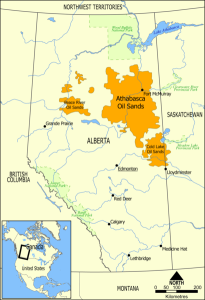The common ground for Oil Sands Float Rights and Hydrological Spread water tax credits . . .is a public resource conservation framework: calculating the AFVPR of a limited resource, so that we can plan for recovery and return of the value of those resources back to their original value, the intrinsic state we all enjoy.
- – Using the AFVPR framework, we obtain market incentive to maximize self-interested conservation of the common resources we all depend on as a species and a civilization.
- – Using AFVPR with Hydrological Spreads . . . we can manage limited supply, drought-induced shortages and over-pumping shortages, and minimize contamination of surface supplies, the water table, and local aquifers. See the AFVPR water discussion here.
- – We can use AFVPR for . . . liquid water and water vapour for drinking, irrigation, and industrial use; energy supplies (hydroelectric, oil, gas, oil sands, solar), public forests, and topsoil).
- – We can use AFVPR to . . . create market incentive to cut industrial waste and contamination to zero (100% Zero Waste),
- – Using AFVPR, governments offer incentive to create new technologies, such as vapour loss monitoring tools, to incentivize zero waste.
- – Using AFVPR, entrepreneurs obtain incentive to create that new technologies, and the jobs that go with it.
The countries, states, and provinces that put AFVPR in place get market advantage first.
Are there ways that AFVPR could be used in your country?
Creative Commons Credit: – Video by Mr. Rain and Thunder


